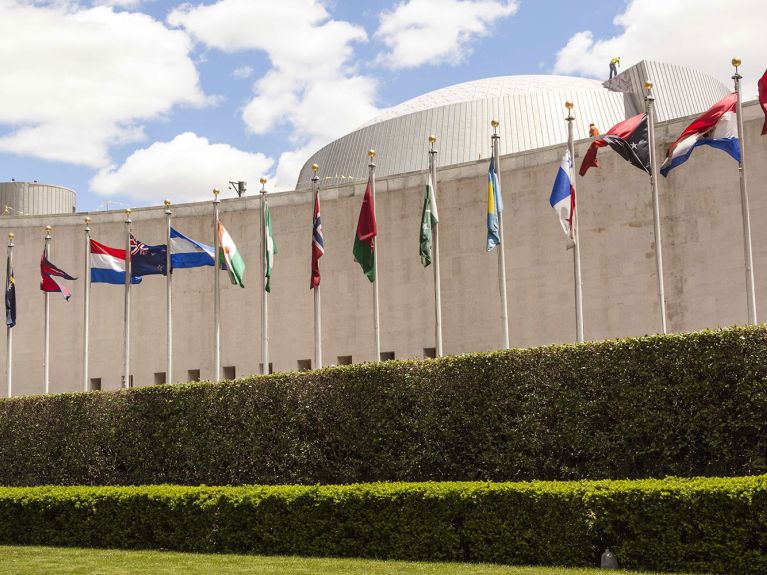Germany and the World
Here are the most important links surrounding Germany’s involvement around the globe in the 21st century.

German Council on Foreign Relations
The German Council on Foreign Relations (DGAP) offers specialist expertise in the field of foreign relations. For more than 50 years the German foreign policy network has been publishing in-depth analyses and organizing top-flight discussion events on numerous topics surrounding international politics and the world regions.
Deutsche Gesellschaft für Internationale Zusammenarbeit (GIZ)
Established in January 2011, the Deutsche Gesellschaft für Internationale Zusammenarbeit (GIZ) brings together the long-standing expertise of the Deutscher Entwicklungsdienst (German Development Service – DED), the Deutsche Gesellschaft für Technische Zusammenarbeit (German agency for technical cooperation – GTZ) and Inwent – Capacity Building International, Germany. The GIZ is a federally owned enterprise which supports international cooperation for sustainable development. Carrying out refugee programmes, dispatching aid workers, providing mediation and conflict guidance or managing reconstruction measures: whatever the need, the GIZ supports people and societies in more than 130 developing, transition and industrialized countries.
German Institute for Human Rights
“Human dignity shall be inviolable.” These are the words that begin the German constitution. They describe a human right. Human rights apply to all human beings, everywhere and without reservation. The German Institute for Human Rights aims to inform people about human rights and assists in implementing international standards and instruments of human rights protection in Germany.
www.institut-fuer-menschenrechte.de
Germany with the United Nations in New York
The third largest contributor, four times member of the Security Council: the Federal Republic is one of the key pillars in the United Nations (UN) which now consists of 193 member states. The organization’s existence and further development are key elements in Germany’s multilateral foreign policy.
Hessian Foundation for Peace and Conflict Research
Exploring peace means understanding the reasons for strife and conflict. Identifying a situation of conflict early can contribute to avoiding that conflict. This is the task that the Hessian Foundation for Peace and Conflict Research (HSFK) has dedicated itself to since it was founded in 1970.
Bonn International Center for Conversation (BICC)
Peace and development: these are the key topics of the Bonn International Center for Conversation (BICC). The researchers at this independent non-profit organization advise politicians and involved actors to help reduce violent conflicts and find peaceful solutions throughout the world.
Munich Security Conference
Is a world without nuclear weapons possible? What protection is there against international terrorism? And how will things proceed in Afghanistan, in the Middle East and on the Horn of Africa? Each year on the first weekend in February, the world’s leading experts in foreign and security policy gather together in the Bavarian capital. The conference hotel Bayerischer Hof is the regular venue for this open dialogue – and quiet back-room diplomacy.
NATO – North Atlantic Treaty Organization
It’s the largest military alliance in the world. Since it was founded in 1949, 28 North American and European states have joined together within the North Atlantic Treaty Organization (NATO). The main aim of the Atlantic Alliance is to mutually protect the borders of the alliance and its member countries. In addition, the alliance promotes peace and freedom with stabilization missions, such as in Afghanistan, and takes action against piracy around the Horn of Africa.
OSCE – Organization for Security and Co-operation in Europe
When this body addresses the question of security, then the European Union speaks with one voice. The Organization for Security and Co-operation in Europe (OSCE) is the continent’s most comprehensive organization relating to security policy. With its 57 participants it is also the only organization in which all the states of North America, Europe and the successor states to the Soviet Union work together. The members of staff are engaged in “field missions” from the Balkans to Central Asia.
United Nations Regional Information Centre (UNRIC) for Western Europe
What exactly does the UN do? The United Nations Regional Information Centre (UNRIC) for Western Europe is the central reference point for citizens from Dublin to Frankfurt/Oder. UNRIC, which is based in Brussels, also has an additional coordination centre in Bonn.
Stiftung Wissenschaft und Politik (SWP)
Which direction should Germany take in the world of the 21st century? The German Institute for International and Security Affairs has been advising the German Bundestag and the German Federal Government on all issues of foreign and security policy since 1962.
World Health Summit
Health is more than the absence of illness and disabilities. The World Health Summit will be addressing the physical, mental and social wellbeing of all people. Since 2009 leading international researchers, physicians, politicians and stake holders in the healthcare system have been meeting to discuss global strategies for better medical research and individual healthcare.
